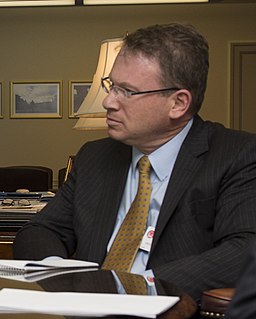A Quote by Neil MacGregor
Creation stories, so central in the religions of the Middle East, play a surprisingly marginal part in Greek myth. The Greeks had nothing to set alongside the resounding 'In the beginning' in the book of Genesis, where one eternal God creates the universe out of nothing.
Related Quotes
Since religion intrinsically rejects empirical methods, there should never be any attempt to reconcile scientific theories with religion. An infinitely old universe, always evolving, may not be compatible with the Book of Genesis. However, religions such as Buddhism get along without having any explicit creation mythology and are in no way contradicted by a universe without a beginning or end. Creatio ex nihilo, even as religious doctrine, only dates to around AD 200. The key is not to confuse myth and empirical results, or religion and science.
Biology occupies a position among the sciences at once marginal and central. Marginal because-the living world constituting but a tiny and very "special" part of the universe-it does not seem likely that the study of living beings will ever uncover general laws applicable outside the biosphere. But if the ultimate aim of the whole of science is indeed, as I believe, to clarify man's relationship to the universe, then biology must be accorded a central position . . .
When it comes to the whole debate today over evolution versus creation, Jesus affirmed the early chapters of Genesis were accurate when He said, "Have you not read, that He who created them from the beginning made them male and female" (Matthew 19:4). Adam and Eve didn't come on the scene after billions of years of mutations and evolution. No. God created them all the way back in the beginning-just like Moses reported in the Book of Genesis.
The only reality we can ever truly know is that of our perceptions, our own consciousness, while that consciousness, and thus our entire reality, is made of nothing but signs and symbols. Nothing but language. Even God requires language before conceiving the Universe. See Genesis: “In the beginning was the Word.
All the Greek mythic heroes had gone east, but they were myths. Achilles was a myth. Perseus, Theseus, Hercules... they probably existed in some form. But they all went east. That's where a Greek went to make his bones so to speak. And Alexander the Great was the first man who actually went east not to plunder, not to loot and come back to Greece - which is where the Macedonians wanted to go back with the money. He stayed. And he became half-Eastern.
Creation is thus God's presence in creatures. The Greek Orthodox theologian Philip Sherrard has written that "Creation is nothing less than the manifestation of God's hidden Being." This means that we and all other creatures live by a sanctity that is inexpressibly intimate, for to every creature, the gift of life is a portion of the breath and spirit of God. (pg. 308, Christianity and the Survival of Creation)
One of the most powerful shocks of the Middle Passage is the collapse of our tacit contract with the universe-the assumption that if we act correctly, if we are of good heart and good intentions, things will work out. We assume a reciprocity with the universe. If we do our part, the universe will comply. Many ancient stories, including the Book of Job, painfully reveal the fact that there is no such contract, and everyone who goes through the Middle Passage is made aware of it.
Analysis of rebellion leads at least to the suspicion that, contrary to the postulates of contemporary thought, a human nature does exist, as the Greeks believed. Why rebel if there is nothing permanent in oneself worth preserving? ... Rebellion, though apparently negative, since it creates nothing, is profoundly positive in that it reveals the part of man which must always be defended.








































